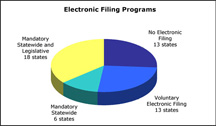|
The
study again found that a number of states
have made progress in the area of electronic
filing of campaign finance reports, and electronic
filing is now mandatory for statewide and/or
legislative candidates in 24 states. Seventy-five percent of the states have an electronic
filing program in place. Seventeen states
received grades in the A range for their electronic
filing programs—more than in any other
category in the study, and four more than last
year. One state received a B in this
category, four states received Cs, and two
received Ds. Twenty-six states received F grades,
indicating there is still significant progress
to be made in this area. The failing
states include those with completely voluntary
electronic filing programs, because of the
value placed on mandatory electronic filing
in the Grading State Disclosure criteria.
- 37 states have an electronic filing program
for candidate campaign finance reports.
- 24 states have some type of mandatory requirement
for electronic filing of campaign finance
reports.
- 18 of these states require electronic filing
by candidates for both statewide and legislative
office.
- 6 states require electronic filing for
statewide candidates only.
- 13 states have voluntary electronic filing
for candidates for statewide and legislative
office.
- Of the 37 states with an electronic filing
program, 34 reported having adequate funds
to administer the program and 3 reported
insufficient funds.
- 13 states have no electronic filing program.
Significant Changes Since 2004:
- 2 states that previously had voluntary
electronic filing programs converted to mandatory
electronic filing for both statewide and
legislative candidates (Maine and New Mexico).
- 1 state that previously only required electronic
filing of statewide candidates added mandatory
electronic filing for legislative candidates
(Hawaii).
- 1 state that previously had a voluntary
electronic filing program added mandatory
electronic filing for statewide candidates
(Indiana).
- 7 states reported increased funding for
electronic filing; three states noted a decrease
in funding.
States
with the strongest electronic filing programs,
all receiving an A+ and tied for first place
in this category, are: Arizona;
Florida; Hawaii; Illinois; Maryland; Massachusetts;
Michigan; New York; Ohio; Texas; and Washington.
States
with no electronic filing (all tied for the
last place rank) are: Alabama;
Arkansas; Idaho; Kansas; Mississippi; Montana;
Nebraska; New Hampshire; North Dakota; South
Carolina; South Dakota; Vermont; and Wyoming.
The
most encouraging trend identified in states’ electronic
filing programs is an increase in the number
of states that mandate electronic filing for
statewide and/or legislative candidates. In
2004, 21 states had mandatory requirements
for electronic filing of campaign finance reports,
and 15 of these required electronic filing
by candidates for both statewide and legislative
office. This year, 24 states have mandatory
requirements for electronic filing of campaign
finance reports, and of these, 18 require electronic
filing for candidates for both statewide and
legislative office. Six states require
electronic filing for statewide office candidates,
but offer voluntary programs for legislative
candidates. The thresholds that trigger mandatory
electronic filing vary by state and type of
candidate, and range in amount from zero (Arizona)
to $250,000 (Connecticut).
In
addition to the 24 states that require electronic
filing of at least some candidates, 13 states
offer completely voluntary electronic filing
programs. While these states still received
failing grades in this category, their ranks
indicate that they are performing substantially
better than those states with no electronic
filing program. Candidate participation
in voluntary electronic filing programs varies
widely throughout the states, from less than
one percent (Delaware) to over 50 percent (Kentucky
and New Jersey for statewide candidates, and
Tennessee for legislative candidates). The
average rate of electronic filing in states
with completely voluntary programs is 27% for
statewide candidates and 25% for legislative
candidates.

click
image to enlarge
Nineteen
states offer a free, web-based filing system
for candidates while twenty states provide
free filing software, and in six of these states
(Delaware, Indiana, Massachusetts, New Jersey, New Mexico and Texas) candidates can take advantage of either option. In
addition, most states provide candidates with
a standard
filing format (technical specifications)
that can be used to ensure reports are filed
in a manner compatible with the filing agency’s
computer system. In their responses to
the Grading State Disclosure 2005 survey, many
states indicated they have improved outreach,
training and technical assistance offered to
candidates, either in response to increased
demand or in expectation of an increased number
of e-filers due to new electronic filing requirements.
Adequate
funding is a critical component of electronic
filing programs; in addition to the resources
necessary to develop such a program, disclosure
agencies also require funding to maintain
and upgrade them, and to provide support
and training to candidates. Fortunately,
most states recognize the need to continue
to provide a stable funding stream that anticipates
both program growth and the need to adapt to
new technology. This year, nearly all
states reported having adequate funding for
their electronic filing programs, and only
three states reported decreased funding.
Thirteen
states (Alabama, Arkansas, Idaho, Kansas,
Mississippi, Montana, North Dakota, Nebraska,
New Hampshire, South Carolina, South Dakota,
Vermont and Wyoming) still have no electronic
filing program in place, though South Carolina
and Montana are in the process of developing one. New
Hampshire, which previously reported that
it offered candidates the option of filing
electronically, clarified in its Grading
State Disclosure 2005 survey answers that
what it actually offers are downloadable
forms that candidates may print and complete,
but then must return via traditional filing
methods such as mail or in-person delivery.
|